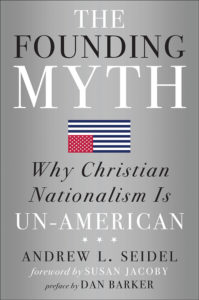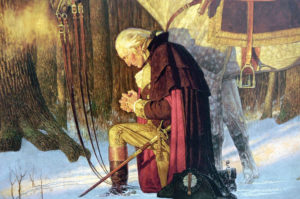The Founding Myth: Why Christian Nationalism Is Un-American

BY ANDREW SEIDEL
STERLING, 2019
352 PP.; $24.95
The first thing I’ll say about Andrew Seidel’s The Founding Myth: Why Christian Nationalism Is Un-American is that it’s sad it had to be written. To many of us, the founding of the United States as a secular nation seems so basic and incontrovertible a fact it’s hard to imagine that it must be argued. And yet it increasingly has to be, as Christian nationalism—the idea that the United States was founded as a Christian nation—continues to grow as a real force in America.
Which is why Seidel’s new book is so important. The Founding Myth not only accurately debunks the historical myths that underly Christian nationalism, with an academic breakdown of the historical record that gives the lie to so many of those myths. It goes a step further by arguing that a close examination of Christianity and the American founding documents show them often to be at odds with each other—that the freedom of thought that exemplifies the US Constitution protects everybody—not just Christians (although it protects them as well). Seidel, a constitutional and civil rights attorney at the Freedom From Religion Foundation, presents a compelling, well-researched, and clearly written argument for the founding of our country as a secular nation.
The book starts with a simple examination of the religious views of the nation’s founders, many of whom, while maybe not atheists, were decidedly not Christian. A perfect example is George Washington. Seidel debunks the “Prayer at Valley Forge”—the popular image of Washington on his knees in the snow—which, it turns out, comes from yet another apocryphal tale by Washington biographer Parson Weems (who also came up with “I cut down the cherry tree”). The story of Washington praying at the Valley Forge winter encampment didn’t even appear until the seventeenth edition of Weems’s biography. From there it appeared in McGuffey Readers and numerous paintings, but there are no true accounts of it happening. In fact, Washington’s religious views suggest he was not a believer in Christian revelation, confirmed by the pastor of Martha Washington’s church, which Washington himself only sparingly attended; by all accounts he never took communion.
Seidel also debunks a more commonly held misbelief, that Washington added the words “so help me God” to the end of the presidential oath (those words are not in the constitutional oath itself.) Again, detailed historical accounts do not record him saying that. In fact, the first president known to have used the words is the otherwise forgettable Chester A. Arthur nearly a hundred years after Washington. Seidel’s book is full of these historical tidbits.
But, The Founding Myth argues persuasively, those views are largely irrelevant anyway, as the founders’ work on our national institutions reflect their political—not religious—beliefs. He explores how the founding historical documents themselves do not set up a Christian nation, or even a set of laws based on Christian principles. As Seidel frames it “Christian nationalists have never convincingly answered a basic question: How, precisely, did the Bible influence American political thought and America’s founding?” As he shows through detailed textual and historical analysis, “American principles and Judeo-Christian principles are so irreconcilable that we can fairly say: Judeo-Christianity is un-American.”

As The Founding Myth substantiates, this never happened. (The Prayer at Valley Forge by Arnold Friberg, 1975)
The book provides a close examination of the Declaration of Independence, followed by the Constitution and the principles enunciated in those documents, many of which arose directly in opposition to prevalent religious beliefs of the times. No phrase is more in opposition to the religious tenor of the day than “We the People,” which clearly enunciates that the basis of power is the people, not some supernatural power.
Seidel then turns to Judeo-Christian principles themselves as found in the Bible, and goes through the most fundamental of them—including the Golden Rule, crime and punishment, obedience to God, original sin and redemption, faith, and biblical government—and compares them directly to America’s founding principles. “The comparison,” he notes, “is disastrous for Christian nationalists.”
He then piles on the argument, scrutinizing each of the Ten Commandments, supposedly so basic a set of rules that Christian nationalists feel they should be displayed regularly in public buildings. Seidel shows how all but the most basic of them (e.g., prohibitions on killing, lying, and stealing, which are not originally or exclusively Christian) are substantially opposed to American principals, as they call for punishment for thoughts, punishment for not only an offender but for their children, punishment for certain forms of speech—you get the idea. Seidel lays it out in chapter after chapter.
The Founding Myth ends with an examination of nationalist tropes such as “In God We Trust,” “one nation under God,” and “God bless America” to show that these were not original to our nation’s founding. Instead, they were grafted onto the American story at various points in our history, some as recently as the 1950s. This highlights one problem Seidel constantly has to deal with, which is the simple fact that much of the Christian nationalism argument is not underpinned by facts but rather by vague history and assumptions. It is to Seidel’s great credit as a writer and researcher that he is able nonetheless to ferret out these assumptions and put them under the lens of historical scrutiny and reason and show them to be just that, false assumptions and faulty logic.
As a humanist, I approached Seidel’s book with a bit of reluctance, figuring that it would be covering ground I already knew and agreed with. But I was pleasantly surprised. While I did agree with pretty much all of it, I was amazed by how much new information the book brought to the table, and by how many purported facts I assumed to be true were not.
Today those untruths are parroted more and more. “As the myths debunked in this book are professed with more desperation, we must be prepared to refute them factually and vocally,” Seidel concludes. “This book provides the first half of that recipe. You are responsible for the rest.”
